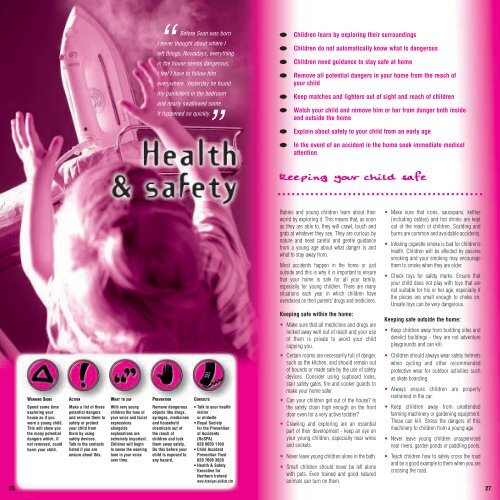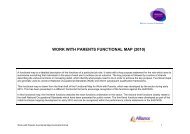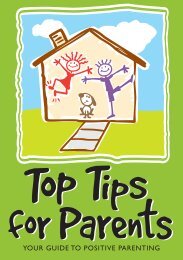Safe Parenting Handbook (PDF 1.07 Mb) - Department of Health ...
Safe Parenting Handbook (PDF 1.07 Mb) - Department of Health ...
Safe Parenting Handbook (PDF 1.07 Mb) - Department of Health ...
- No tags were found...
Create successful ePaper yourself
Turn your PDF publications into a flip-book with our unique Google optimized e-Paper software.
WARNING SIGNS“Before Sean was bornI never thought about where Ileft things. Nowadays, everythingin the house seems dangerous.I feel I have to follow himeverywhere. Yesterday he foundmy painkillers in the bedroomand nearly swallowed some.It happened so quickly.”Children learn by exploring their surroundingsChildren do not automatically know what is dangerousChildren need guidance to stay safe at homeRemove all potential dangers in your home from the reach <strong>of</strong>your childKeep matches and lighters out <strong>of</strong> sight and reach <strong>of</strong> childrenWatch your child and remove him or her from danger both insideand outside the homeExplain about safety to your child from an early ageIn the event <strong>of</strong> an accident in the home seek immediate medicalattentionkeeping your child safe26Spend some timeexploring yourhouse as if youwere a young child.This will show youthe many potentialdangers which, ifnot removed, couldharm your child.ACTIONMake a list <strong>of</strong> thesepotential dangersand remove them tosafety or protectyour child fromthem by usingsafety devices.Talk to the contactslisted if you areunsure about this.WHAT TO SAYWith very youngchildren the tone <strong>of</strong>your voice and facialexpressionsalongsideexplanations areextremely important.Children will beginto sense the warningtone in your voiceover time.PREVENTIONRemove dangerousobjects like drugs,syringes, medicinesand householdchemicals out <strong>of</strong>the reach <strong>of</strong>children and lockthem away safely.Do this before yourchild is exposed toany hazard.CONTACTS• Talk to your healthvisitoror midwife• Royal Societyfor the Prevention<strong>of</strong> Accidents(RoSPA)028 9050 1160• Child AccidentPrevention Trust020 7608 3828• <strong>Health</strong> & <strong>Safe</strong>tyExecutive forNorthern Irelandwww.hsenigov.uk/kids.cfmBabies and young children learn about theirworld by exploring it. This means that, as soonas they are able to, they will crawl, touch andgrab at whatever they see. They are curious bynature and need careful and gentle guidancefrom a young age about what danger is andwhat to stay away from.Most accidents happen in the home or justoutside and this is why it is important to ensurethat your home is safe for all your family,especially for young children. There are manysituations each year in which children haveoverdosed on their parents’ drugs and medicines.Keeping safe within the home:• Make sure that all medicines and drugs arelocked away well out <strong>of</strong> reach and your use<strong>of</strong> them is private to avoid your childcopying you.• Certain rooms are necessarily full <strong>of</strong> danger,such as the kitchen, and should remain out<strong>of</strong> bounds or made safe by the use <strong>of</strong> safetydevices. Consider using cupboard locks,stair safety gates, fire and cooker guards tomake your home safer.• Can your children get out <strong>of</strong> the house? Isthe safety chain high enough on the frontdoor even for a very active toddler?• Crawling and exploring are an essentialpart <strong>of</strong> their development - keep an eye onyour young children, especially near wiresand sockets.• Never leave young children alone in the bath.• Small children should never be left alonewith pets. Even trained and good naturedanimals can turn on them.• Make sure that irons, saucepans, kettles(including cables) and hot drinks are keptout <strong>of</strong> the reach <strong>of</strong> children. Scalding andburns are common and avoidable accidents.• Inhaling cigarette smoke is bad for children’shealth. Children will be affected by passivesmoking and your smoking may encouragethem to smoke when they are older.• Check toys for safety marks. Ensure thatyour child does not play with toys that arenot suitable for his or her age, especially ifthe pieces are small enough to choke on.Unsafe toys can be very dangerous.Keeping safe outside the home:• Keep children away from building sites andderelict buildings - they are not adventureplaygrounds and can kill.• Children should always wear safety helmetswhen cycling and other recommendedprotective wear for outdoor activities suchas skate boarding.• Always ensure children are properlyrestrained in the car.• Keep children away from unattendedfarming machinery or gardening equipment.These can kill. Stress the dangers <strong>of</strong> thismachinery to children from a young age.• Never leave young children unsupervisednear rivers, garden ponds or paddling pools.• Teach children how to safely cross the roadand be a good example to them when you arecrossing the road.27






